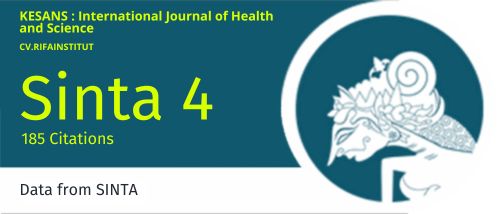Health Intervention for Dengue Prevention in Dili Municipality, Timor-Leste, 2024 Year
DOI:
https://doi.org/10.54543/kesans.v4i9.373Keywords:
Health Intervention, Prevention, DengueAbstract
Introduction: Dengue fever, a mosquito-borne viral disease, causes significant public health problems, especially in countries with limited human resources for disease control and prevention. In Timor-Leste, every year, a new outbreak of dengue fever occurs. Objective: The study aimed to find out the Health Intervention for Dengue Prevention. Method: This study utilized quantitative descriptive research with a cross-sectional approach, targeting 97 households in Dili Municipality. A purposive sampling technique was used, and data were collected using a questionnaire. Descriptive statistics and Pearson's Product-Moment correlation were used to analyze the data. Result and Discussion: The study found that health promotion is effective to preventing dengue with a success rate of 47.4% and a failure rate of 22.7%. A significant correlation was found between health promotion and dengue fever prevention. Fumigation was found to be the most effective method, with a 50.5% success rate and a 29.9% failure rate. Slaughter was also found to be effective, with a 45.4% success rate and 29.9% failure rate. Health promotion in preventing dengue fever in Timor-Leste is important. Conclusion: However, a lack of awareness and understanding hinders progress. Bottom-up strategies should involve all community members, not just those following best practices. The Ministry of Health is implementing fumigation campaigns, but environmental control, awareness raising, adoption, and empowerment are also needed.
Downloads
Published
How to Cite
Issue
Section
Citation Check
License
Copyright (c) 2025 Aniceto da Conceicao Pacheco, Levi Anatolia S. M. Exposto, Felisbela A. O. de Oliveira, Jimedio A. C. Quim, Eliseba Borges Ximenes, Marcos Carvalho

This work is licensed under a Creative Commons Attribution-ShareAlike 4.0 International License.





















